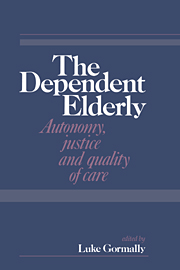Book contents
- Frontmatter
- Contents
- List of contributors
- 1 Introduction
- 2 Difficult choices in treating and feeding the debilitated elderly
- 3 The American debate about artificial nutrition and hydration
- 4 Reflections on Horan and Boyle
- 5 The Living Will: the ethical framework of a recent Report
- 6 Some reflections on euthanasia in The Netherlands
- 7 Is there a policy for the elderly needing long-term care?
- 8 Is it possible to provide good quality long-term care without unfair discrimination?
- 9 The prospects for long-term care: current policy and realistic alternatives
- 10 What is required for good quality in long-term care of the elderly?
- 11 Should age make a difference in health care entitlement?
- 12 Economic devices and ethical pitfalls: quality of life, the distribution of resources and the needs of the elderly
- 13 The Aged: non-persons, human dignity and justice
- 14 Economics, justice and the value of life: concluding remarks
- Index
5 - The Living Will: the ethical framework of a recent Report
Published online by Cambridge University Press: 01 October 2009
- Frontmatter
- Contents
- List of contributors
- 1 Introduction
- 2 Difficult choices in treating and feeding the debilitated elderly
- 3 The American debate about artificial nutrition and hydration
- 4 Reflections on Horan and Boyle
- 5 The Living Will: the ethical framework of a recent Report
- 6 Some reflections on euthanasia in The Netherlands
- 7 Is there a policy for the elderly needing long-term care?
- 8 Is it possible to provide good quality long-term care without unfair discrimination?
- 9 The prospects for long-term care: current policy and realistic alternatives
- 10 What is required for good quality in long-term care of the elderly?
- 11 Should age make a difference in health care entitlement?
- 12 Economic devices and ethical pitfalls: quality of life, the distribution of resources and the needs of the elderly
- 13 The Aged: non-persons, human dignity and justice
- 14 Economics, justice and the value of life: concluding remarks
- Index
Summary
Introduction
The Living Will. Consent to Treatment at the End of Life is the Report of a Working Party established jointly by Age Concern England and The Centre of Medical Law and Ethics of King's College, London. It was published in 1988.
The Working Party of seven was chaired by Professor Ian Kennedy, and, apart from the Director of Age Concern, was composed of three doctors and three lawyers.
Their Report is undoubtedly the most important point of reference for the discussion of advance directives in the British context. This discussion has been given some degree of urgency by the advocacy of Living Wills over a number of years by the Voluntary Euthanasia Society.
As one would expect from the composition of the Working Party, there is much that is illuminating in the Report about medical practice and the interpretation of English law. But the Report also aspires to offer an ethical framework for advance directives.
After providing some information on parts of the Report which highlight the importance of its discussion of the ethics of advance directives (section 2), I then go on to analyse what it has to say on this topic (section 3). Section 4 offers a critique of the ethical framework proposed by the Report, and the final section (5) makes some summary observations on the implications for public policy suggested by reflection on the Report's proposed ethical underpinning of advance directives.
- Type
- Chapter
- Information
- The Dependent Elderly , pp. 53 - 69Publisher: Cambridge University PressPrint publication year: 1992
- 2
- Cited by



